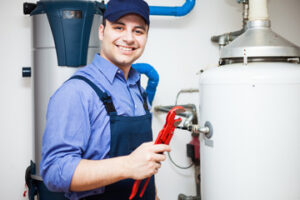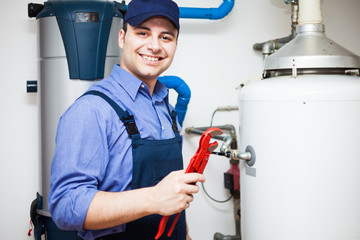Plumbers are responsible for installing, repairing and maintaining the pipes that distribute clean water, remove waste, and connect heating and cooling systems. They must be comfortable working with their hands and using a variety of tools.
Other important skills include being able to interpret blueprints and building codes. They also need to be able to identify and troubleshoot issues like leaks and clogs. Read on Plumbers Near Me Prices for more information.
Water is necessary for survival, but it’s also a vital ingredient to our well-being. It keeps us hydrated and flushes out toxins from our bodies, helps regulate body temperature and so much more. Unfortunately, millions of people around the world don’t have access to clean water. This is largely due to a lack of proper plumbing systems that would bring clean water into homes and transport waste out of them.
Plumbers are the gatekeepers of clean water, and they install, maintain and repair the pipes and systems that provide households with fresh, safe drinking water. They prevent contaminants from entering drinking water sources by ensuring that sewage systems and drainage are working correctly, and they reduce the risk of waterborne diseases by ensuring that pipes are free from harmful bacteria, rust, and other debris.
Plumbers can also help households with their water quality by installing filtration systems to remove dangerous substances from household water. Water filtration systems are especially important for households with hard water, which is more likely to contain mineral deposits that can cause damage to pipes and fixtures over time. Addressing your home’s water quality will also increase your awareness of your plumbing system, making it easier to detect issues like leaks and corrosion before they become major problems. This can save you both money and hassle down the road. The key to maintaining your plumbing is regular inspections and cleaning.
Drainage
The plumbing system does two primary things: delivers water to you, and removes wastewater. The latter is especially important since it contains things like cleaning chemicals and sewage, which could otherwise contaminate your drinking water or cause disgusting messes in your home. Drainage is crucial, and plumbers can help you make sure yours are working properly.
Plumbers must be in good physical shape, as they will often be required to work in cramped spaces and position themselves in awkward positions. They should also be comfortable using tools and have great coordination skills, as they may need to perform multiple tasks at once in high-pressure situations. Additionally, plumbers must be able to read blueprints and diagrams well in order to determine the best location for pipes and other hardware.
A good plumber will always take the time to answer any questions a client may have. They will be respectful and polite, and they will explain the problem and its solutions in a way that is easy for the average person to understand. They will also use clear language without any jargon or technical terms, which will minimize the chances of misunderstandings and conflicts.
Another vital skill for a plumber is the ability to find solutions that are environmentally friendly. Many consumers today are seeking green options for their homes and businesses, and plumbers who can provide them with these options will be able to boost their reputation as reliable and responsible professionals. Some plumbers even offer discounts for eco-friendly services, which can save you money in the long run while helping the environment.
The best way to find a quality plumber is to ask for referrals from other homeowners or local businesses that have used their services in the past. These references will give you a good idea of the plumber’s level of expertise and whether or not they are right for your needs. You can also try to find out what other people have said about their experience with the plumber in question, and look for reviews online. Additionally, it is a good idea to only hire plumbers who are licensed and insured in your area. This will ensure that you are getting a qualified professional who follows all safety protocols when working on your property.
Venting
The network of pipes that make up a home’s plumbing system relies on ventilation to equalize pressure and keep wastewater flowing freely. Without proper ventilation, water and waste can form a vacuum in the drains that causes clogs and other serious problems. Vents also provide a path for sewer gases to escape safely into the air outside, helping to prevent unpleasant odors from entering living spaces.
Proper plumbing venting ensures that your home’s drainage system always functions efficiently and safely. Plumbers can inspect your current venting system to make sure it’s up to code and free of obstructions, then recommend any necessary upgrades.
Preventing Clogs and Backups
A lack of ventilation can lead to a condition called airlock, wherein the P-traps fill with water and create a seal that stops wastewater from flowing out of the fixture. This can cause a blockage that requires extensive repairs or even replacement of the pipe. Plumbing vents prevent this by ensuring that there’s always enough air in the pipes to keep them flowing properly.
Minimizing Odors
Without proper ventilation, sewer gasses can build up in your pipes and enter your home, causing unpleasant odors. Vents help to eliminate these odors by carrying the gasses outside, where they can be expelled as naturally occurring carbon dioxide. They can also protect the integrity of your pipes by preventing excessive pressure within them that could lead to damage over time.
Venting Options
There are several different ways that a plumber can provide ventilation for your plumbing system. One method is to install a vent stack that runs up through the roof to allow air to enter and exit the system at all times. This is the most common type of venting, but it’s not ideal for every situation. For example, if you have an island sink or other fixtures that can’t connect directly to the stack, you may need to install a loop vent that goes up and over the fixture before descending to join the stack. Another option is an air admittance valve (AAV), which can be installed on individual fixtures to let air in when the fixture is draining and then close to prevent sewer gases from escaping into your living space.
Waste Disposal
The average household generates plenty of food waste, and a garbage disposal helps reduce the amount of space needed to store it. However, the unit can’t handle everything. Certain items like coffee grounds, eggshells, grease, pasta, and potato peels aren’t safe for the disposal. These can ruin the disposal and clog drains.
While some homeowners can handle a garbage disposal installation on their own, it’s usually best left to a professional plumber. These experts can offer a wide range of services, including removal and recycling of old units, plumbing connections, and electrical wiring that complies with local codes. They can also address pre-existing issues that could make the unit inoperable or cause leaks, saving customers both time and money.
Plumbing waste may contain chemicals that are dangerous to humans and animals, as well as the environment. These materials need to be stored, transported, and disposed of properly to prevent environmental hazards. Some of these chemicals include corrosives, solvents, and toxic waste.
Corrosive chemicals and solvents, such as paint thinner, turpentine, linseed oil, xylene, and alcohols, should never be poured down the drain. They’re considered hazardous waste and can contaminate soil, groundwater, and surface water. Instead, these substances should be deposited in designated chemical containers.
A plumber can help determine what type of waste you have and recommend the proper disposal methods. They can also provide information on how to recycle or reuse different types of materials. This can help you cut back on landfill waste and create a more sustainable lifestyle.
If you’re considering a garbage disposal installation, an expert plumber from Haller can assist with the entire process. They’ll inspect your sink, ensure the new disposal is compatible, and handle any necessary plumbing connections. They’ll also make sure the unit is up to code and free of leaks. In addition, they’re skilled at troubleshooting mechanical issues and can repair or replace the unit quickly.
To maintain a functioning disposal, run cold water before and after using it, and occasionally clean the unit with ice cubes or citrus peels. Running cold water helps waste flow through the P-trap and out of the drainage pipe, and occasional cleaning will keep the disposal’s blades sharp and smelling fresh. When you turn off the disposal, be sure to run the water for another thirty seconds to clear the drain and prevent clogging.
